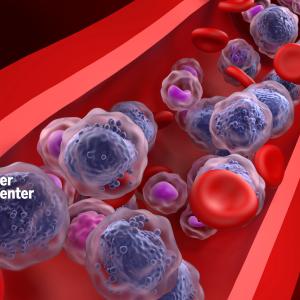
Benjamin G. Neel, MD, PhD, in his lab discussing data with colleagues.
Photo: Karsten Moran
Vitamin C may “tell” faulty stem cells in the bone marrow to mature and die normally, instead of multiplying to cause blood cancers. This is the finding of a study led by researchers from Perlmutter Cancer Center at NYU Langone Health, and published online August 17 in the journal Cell.
Certain genetic changes are known to reduce the ability of an enzyme called tet methylcytosine dioxygenase 2, or TET2, to encourage stem cells to become mature blood cells, which eventually die, in many patients with certain kinds of leukemia, say the authors. The new study found that vitamin C activated TET2 function in mice engineered to be deficient in the enzyme.
“We’re excited by the prospect that high-dose vitamin C might become a safe treatment for blood diseases caused by TET2-deficient leukemia stem cells,” corresponding study author Benjamin G. Neel, MD, PhD, professor in the Department of Medicine and director of Perlmutter Cancer Center, tells New Scientist.
Changes in the genetic code that reduce TET2 function occur in 10 percent of patients with acute myeloid leukemia (AML) and in 30 percent of those with a form of preleukemia called myelodysplastic syndrome.
Read more from New Scientist.

